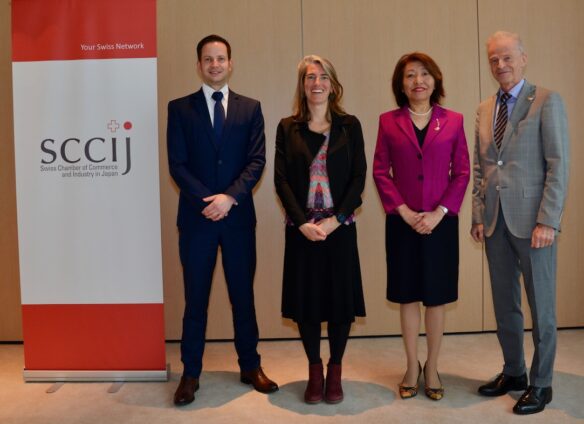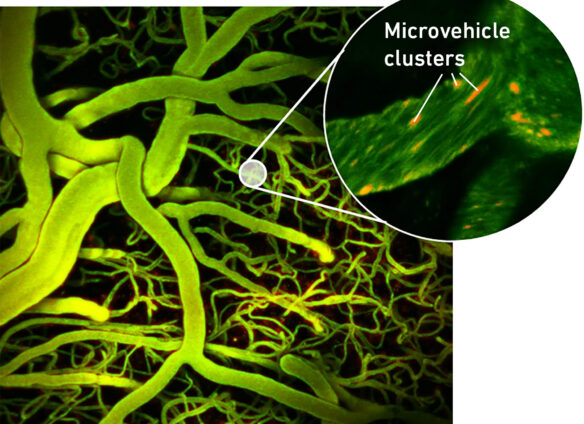Tokyo (SCCIJ) – At the SCCIJ Shinnenkai-Luncheon Mr. Daiju Aoki, Regional Chief Investment Officer and Chief Economist for Japan for UBS SuMi TRUST Wealth Management, gave a rather positive outlook for Japan’s economic development in 2022. Looking further ahead, decarbonization would present a new growth opportunity. Almost 40 members and guests joined the first SCCIJ luncheon of the new year.
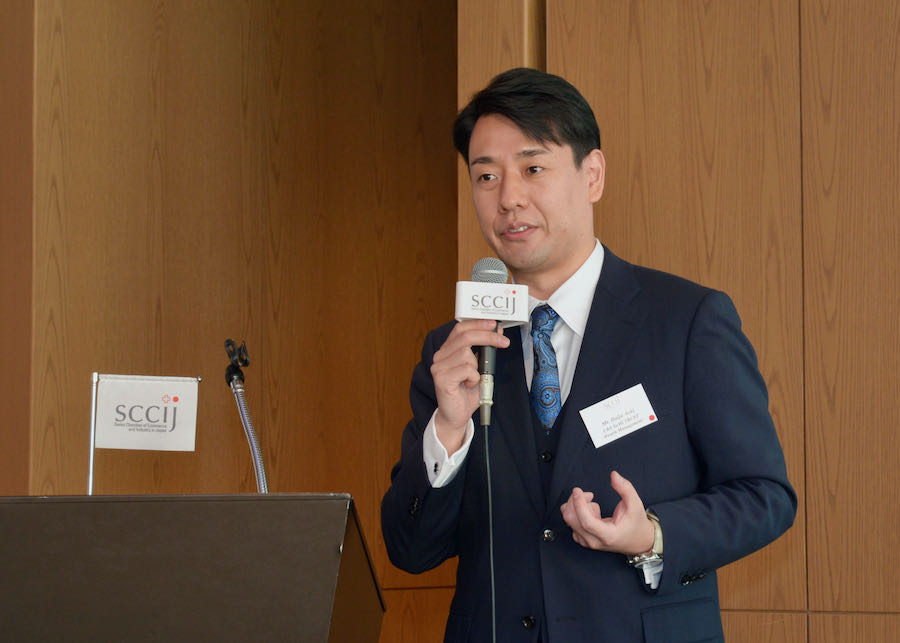
Mr. Daiju Aoki of UBS SuMi TRUST Wealth Management speaks at the SCCIJ Shinnenkai-Luncheon.
Shift into consumption
The speaker started with a mixed bag of growth forecast: Compared to last year UBS expects a lower growth rate of the world economy (+4.4%) with slow-downs in the U.S. (+4.4%) and China (+5.4%), but a stronger growth of 3.5% for Japan, about twice the pace of 2021.
The forecasts are mainly based on the expectation that citizens will shift their surplus savings of the pandemic to consumption. Japan registered 41 trillion yen of excess savings during the pandemic, equaling more than 7% of gross domestic product. Every household in Japan has saved an extra 600,000 yen mainly due to restrictions on traveling and eating out.
Activities in service sectors in Japan have already improved after lifting the state of emergency at the end of September. Most affected were accommodations, amusement parks, and air passenger transport. The current infection wave has dented mobility in January again, but less than during the last wave in the summer of 2021. “Hence, there remains large room for catch-up consumption in the months ahead,” the speaker judged.
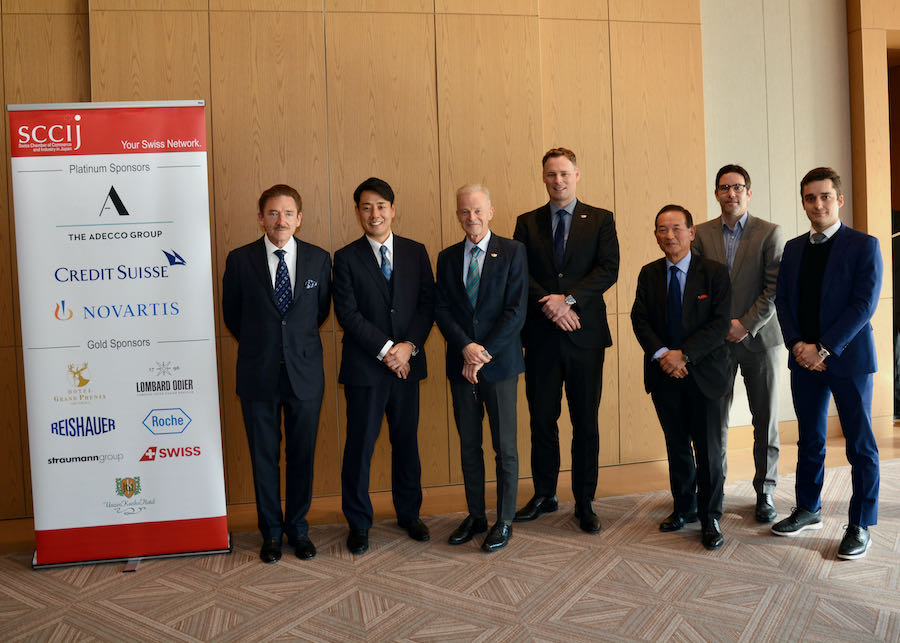
Members of the SCCIJ Executive Committee with Luncheon Speaker Mr. Daiju Aoki and Dr. Andreas Baum, Ambassador of Switzerland to Japan (first from left).
Decrease of manufacturing jobs
Global inflation will remain high, but peak during the first half of the year, Mr. Aoki said. The price trend in Japan would be weaker than in the US and Europe. Inflation might go up to around 1.5% and stabilize between 1.0% and 1.5% in the second half of 2022. A wage growth of 3% would be necessary to achieve 2% inflation stability, but this would be not likely.
One reason for the weak wages is the “collapse of middle-class workers”, as Mr. Aoki described it. This means a decrease in well-paid manufacturing jobs and an increase in the number of workers in relatively low-wage industries such as retail, medical, and nursing. But the trend would be different by age group, he reported.
On the one hand, the increase in minimum wages and the rising share of regular workers have been supporting wage growth for younger generations. On the other hand, wages for the middle age groups did not increase well. E.g., from 2012 to 2019, wages for the 30-34-year-old group went up by 16.6%. But income for the age group 45-49 decreased by 7.0%.
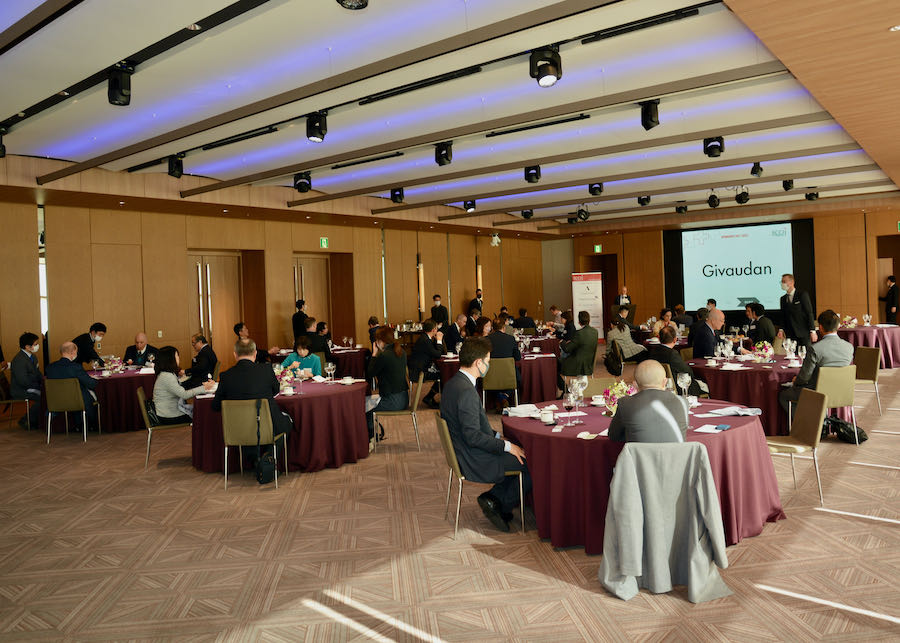
SCCIJ January Luncheons traditionally present an economic forecast for the new year.
Lowered competitiveness
Another concern for economists is the declining earning power of industry in Japan. Earnings from exports have decreased, while income from overseas investment remains solid, Mr. Aoki explained. One trend behind this is the lowered impact on earnings from the weakening yen since 2010 compared to the first decade of this century.
“There may be a risk that Japan’s current account falls into negative if this trend continues,” the speaker warned. In addition, the mild deflation in Japan during the last two decades has decreased the purchasing power of its currency measured by the real effective exchange rate which accounts for rising costs abroad. For example, a Big Mac in the U.S. now costs twice as much as the same product in Japan.
According to the speaker, the international competitiveness of Japan in the semiconductor sector has decreased from 50% in 1988 to 10% in 2019. Also, the share of Japan’s robot sales in China went down because China has been promoting insourcing of technology. At the same time, Japan would have “lots of potentials” in green technologies, Mr. Aoki argued. In particular, Japan could play out its strengths in electric vehicles and batteries. “Thus, decarbonization may drive manufacturing and increase wages and wealth”, he ended his talk.
Biography of the speaker
Mr. Daiju Aoki is the Regional CIO and Chief Economist for Japan at UBS SuMi TRUST Wealth Management. Before joining the wealth management division, he served as Economist for UBS Investment Bank’s Equity Research franchise in Japan. Mr. Aoki joined UBS Securities in 2010. Earlier, he served nine years as an economist in Japan’s Cabinet Office under the Koizumi, Abe, and Fukuda Cabinets. Mr. Aoki holds a Master’s degree in Economics (ABD) from Brown University.
Text and photos: Martin Fritz for SCCIJ




